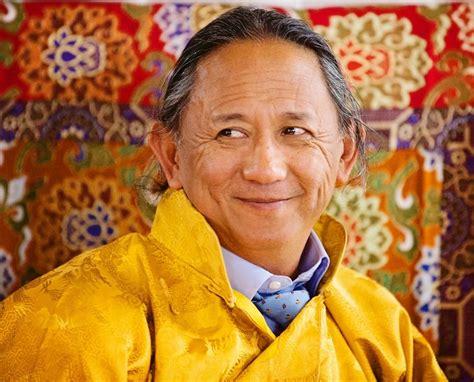A Quote by Thubten Yeshe
Having no background in philosophic thought and ignorant of the reasons supporting their faith, they experience great uneasiness when someone questions their beliefs. Such people often live closely guarded lives, fearful of encountering someone or something that might shatter their insecure spiritual foundation.This attitude, however, is not the fault of religion but of their own limited understanding. True Dharma leads in exactly the opposite direction. It enables one to integrate all the many diverse experiences of life into a meaningful and coherent whole, thereby banishing fear and insecurity completely.
Quote Topics
Attitude
Background
Beliefs
Closely
Coherent
Dharma
Direction
Diverse
Enables
Exactly
Experience
Experiences
Faith
Fault
Fear
Fearful
Foundation
Great
Guarded
Having
However
Ignorant
Insecure
Insecurity
Integrate
Leads
Life
Limited
Live
Lives
Many
Meaningful
Might
Often
Opposite
Opposite Direction
Own
People
Philosophic
Questions
Reasons
Religion
Shatter
Someone
Something
Spiritual
Supporting
Thereby
Thought
True
Understanding
Uneasiness
Whole
Related Quotes
It is never too late to strengthen the foundation of faith. There is always time. With faith in the Savior, you can repent and plead for forgiveness. There is someone you can forgive. There is someone you can thank. There is someone you can serve and lift. You can do it wherever you are and however alone and deserted you may feel.
When I was younger, I thought that the key to success was just hard work. But the real foundation is faith. Faith - the idea that 'I can do it' - is the opposite of fear ('What if I fail?'). And faith creates motivation which in turn leads to commitment, hard work, preparation ... and eventually success.
We've had a wonderful, wonderful life together. We've been in many places, we've had the experiences, and now we have the memories. But most of all we have developed the solid knowledge and understanding and background regarding the foundation stones of life, so that we know for a surety that what we are doing [in helping to build the Kingdom of God] is true. Those foundation stones are granite stones; not soft, not limestones. They are granite.
One of the things is when you think, "Wait, I'm fearful of retaliation, I'm fearful of oppression because of someone who is going into a public office, who might be vengeful for their own personal reasons, that's actually not a reason to hide - that's a reason to step up, right?"This is part of what we learned from the 1920s.
Literature presents you with alternate mappings of the human experience. You see that the experiences of other people and other cultures are as rich, coherent, and troubled as your own experiences. They are as beset with suffering as yours. Literature is a kind of legitimate voyeurism through the keyhole of language where you really come to know other people's lives--their anguish, their loves, their passions. Often you discover that once you dive into those lives and get below the surface, the veneer, there is a real closeness.
I have to say that my background in comedy, of performing live, has been such a great foundation for what we do now on camera. I really value having that kind of experience. Because when you're doing comedy shows you're writing your own material and trying it out on people and you know people find funny and don't.
Life experience. I can talk it up, vow to broaden my horizons, but I’m still limited to the experiences with my life. How can a person understand an experience that lies completely outside her own? She can see it, feel it, imagine what it would be like to live it, but it’s no different from seeing a movie on a screen and saying, “Thank God that’s not me”.
What was love, really? Flowers, chocolate, and poetry? Or was it something else? Was it being able to finish someone's jokes? Was it having absolute faith that someone was there at your back? Was it knowing someone so well that they instantly understood why you did the things you did—and shared those same beliefs?

































